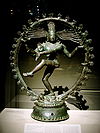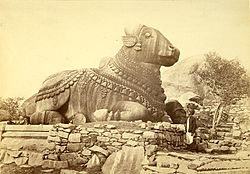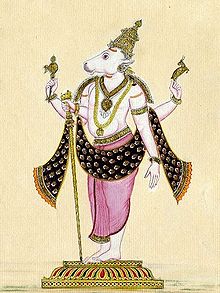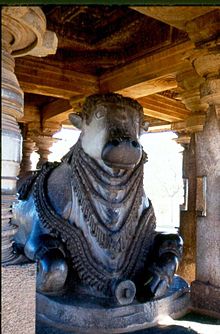- Nandi (bull)
-
Nandi or Nandin (Tamil: நந்தி Sanskrit: नंदी), is now universally supposed to be the name for the bull which serves as the mount (Sanskrit: vāhana) of Shiva and as the gate keeper of Shiva and Parvati in Hindu mythology. Temples venerating Shiva and Parvati display stone images of a seated Nandi, generally facing the main shrine. There are also a number of temples dedicated solely to Nandi.
But the application of the name Nandin to the bull (Sanskrit: vṛṣabha) is in fact a development of recent centuries, as Gouriswar Bhattacharya has documented in an illustrated article entitled "Nandin and Vṛṣabha" [1] The name Nandin was earlier widely used instead for an anthropomorphic deity who was one of Śiva’s two door-keepers, the other being Mahākāla. The doorways of pre-tenth-century North Indian temples are frequently flanked by images of Mahākāla and Nandin, and it is in this rôle of Śiva’s watchman that Nandin figures in Kālidāsa’s poem the Kumārasambhava.
Contents
In Hinduism
- A primary god: Nandi as a separate god can be traced back to Indus Valley Civilization, where dairy farming was the most important occupation, thus explaining the appearance of various artifacts, such as the 'Pasupati Seal,' indicating a deity much like Shiva. This deity- also known as Pasupati is believed to have been worshipped as the keeper of herds. Some puranas describe Nandi or Nandikeshvara as bull faced with a human body that resembles that of Shiva- in proportion and aspect, although with four hands, two hands holding the Parasu (the axe) and Mruga (the antelope) and the other two hands joined together in the Anjali(obeisance). Brahma Vaivarta Purana mentions Krishna himself to have taken the form of a bull as no one else in the Universe can bear Shiva.
- Vehicle of Shiva: The bull Nandi is Shiva's primary vehicle and is the principal gana (follower) of Shiva.
- Gate keeper of Shiva's abode: The close association of Shiva and Nandi explains the presence of a statue of Nandi at the gate of many temples dedicated to Shiva. It also explains why the word "nandi" in the Kannada, Telugu and Tamil languages is used as a metaphor for a person blocking the way. In Sanskrit, a bull is called "vrisha", which has another connotation - that of righteousness or Dharma. It is important to seek the blessings of Nandi before proceeding to worship Lord Shiva.
- Chief in Shiva's army: Some Puranas mention that Nandi lead the Shiva Ganas, Shiva's attendants.
- A Guru of Saivism: In addition to being his mount, Nandi is Shiva's foremost disciple. In the Natha/Siddhar tradition, Nandi is one of the primal gurus. He was the guru to Siddhar Thirumulanathar, Patanjalinathar and others.
- From the yogic perspective, Nandi/Nandhi/ Nandikeshvara is the mind dedicated to Lord Siva, the Absolute. In other words, to understand and absorb Light, the 'experience and the wisdom' is Nandi which is the Guru within.
Legends
According to some puranas, Nandi was born out of the right side of Vishnu resembling Shiva exactly and given as a son to the sage Salankayana. Some puranas mention him as the son of the sage Silada who got him by the grace of Shiva.
It was Nandi who cursed Ravana (the demon King of Lanka) that his kingdom would be burnt by a monkey (Vanara). And later Hanuman burnt Lanka when he went in search of Sita, who was kept prisoner by Ravana in Ashok Vatika. In one puranic story, it is stated that once Siva and Parvathi were playing a game of dice. For any game there has to be an umpire, who has to declare who is the winner. Siva and Parvathi agreed to have Nandi (the divine bull) as the umpire. Nandi is a favorite of Siva, as he is Siva's vehicle. Although Siva lost the game, Nandi declared him the winner. It is stated that Parvathi was indignant over Nandi's partiality for Siva and cursed him that he should die from an incurable disease. Thereupon Nandi fell at the feet of Parvathi and pleaded for forgiveness. "Mother forgive me. Should I not show at least this amount of gratitude to one who is my master? Is it not humiliating for me to declare that my master has lost the game? To uphold his honor I no doubt uttered a lie. But am I to be punished with such severity for so small an offence?" Nandi prayed for forgiveness in this manner. Parvathi forgave Nandi and taught him the means to atone for his lapse. She told him. "The Chaturdasi day in the month of Bhadrapada is the day when my son's birthday is celebrated. On that day you have to offer to my son what pleases you most (green grass)". This means that one atones for one's sins when one offers to the Lord what is most pleasing and enjoyable to him. For Nandi the most enjoyable and relishing food is green grass. As directed by Parvathi Nandi worshipped Ganapathi by offering green grass. Nandi was then relieved of his dreaded disease. His health improved and by the grace of Parvathi he was redeemed.
When the positive forces, the devas, and the negative forces, the asuras, joined together on a rare occasion to churn the ocean with a mountain to obtain the nectar of immortality they utilized Vasuki, the serpent, as the rope. The devas pulled from one end and the asuras from the other. Lots of precious herbs and gems were produced during the Churning and one of them was a poison (halāhala) which became human karma. This "poison" was so dangerous that none of the devas or asuras wanted to go near it. It was extremely sticky and coming into contact with this poison, i.e., human karma, would drag the divinity down to the realms of human suffering and ego. As everyone else ran away, Lord Siva, followed by Nandi, came forward to help as he was the only one who could counteract this deadly poison. Siva took the poison into his hand and drank it, the descent of the poison was in turn stopped at His throat, by His divine consort. Siva is therefore also known as Nīlakaṇṭha (the blue-throated one) and Viṣakaṇṭha (the poison-throated one). Nandi saw some of the poison spill out of Siva's mouth and immediately drank if off the ground. The devas and asuras watching were shocked and wondered aloud what would happen to Nandi. Lord Siva calmed their fears saying, "Nandi has surrendered into me so completely that he has all my powers and my protection".
Largest Nandis in India
- Lepakshi, Andhra Pradesh
- Brahadishwara Temple, Tamil Nadu
- Chamundi Hills, Mysore, Karnataka
- Bull Temple, Bangalore, Karnataka
- Rameswaram, Tamil Nadu
- Hoysaleswara Temple, Halebidu, Karnataka
- Shanthaleswara Temple, Halebidu, Karnataka
- Vadakkunnathan Temple, Thrissur, Kerala
See also
- Apis (Egyptian mythology)
- Awal
- Kamadhenu
- Cattle in religion
- Ramachandrapura Math
Misc
The white color of the bull symbolizes purity and justice.
Women visit images of Nandi, bringing floral offerings, and touch the stone. Their prayers are for fertility. Additionally, it is also considered a custom among some to whisper the fact of their visit, to that shrine, while requesting the faithful attendant to inform his master of the same.
References
- Dictionary of Hindu Lore and Legend 2004 (ISBN 0-500-51088-1) by Anna Dallapiccola
- ^ Gouriswar Bhattacharya, "Nandin and Vṛṣabha", Zeitschrift der Deutschen Morgenländischen Gesellschaft, Supplement III,2, XIX. Deutscher Orientalistentag, 1977, pp. 1543-1567.
External links
- Shiva - the Ascetic God by Madhuri Guin (the contents of this link cannot be viewed in India)
- Inspired by the South Indian Siddhars Nandhi.com
- Free netcast on Vedic Mythology Weekly netcast with stories about Hindu Gods and Goddesses
Shaivism Topics
History 
Deities Texts Shvetashvatara Upanishad · Shiva Rahasya Purana · Shiva Purana · Shiv Chalisa · Shiva mahimna stotram · Shiva Sahasranama · Shiva Tandava StotraPhilosophies Jyotirlingas Somnath · Mallikārjuna · Mahakaleshwar · Omkareshwar · Kedarnath · Bhimashankar · Kashi Vishwanath · Trimbakeshwar · Rameshwar · Grishneshwar · Vaidyanath · NageshwarTraditions Hindu deities and texts Gods 
Goddesses Texts Categories:- Hindu legendary creatures
- Hindu gods
- Hindu symbols
- Mythological bovines
Wikimedia Foundation. 2010.




